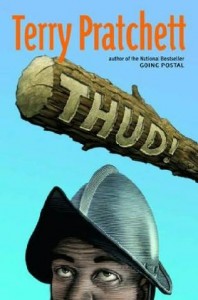by John Holbo on December 22, 2009
Watched the classic Rudolph the Red-Nosed Reindeer X-Mas special with the kids last night. I wonder: was such a message of tolerance, across color lines, considered faintly radical in 1964? (Did anyone object to this X-Mas special when it came out?) Well, anyway, Zoë (the 8-year old) was disturbed by the fact that Santa was morally in the wrong for most of the show, incapable of distinguishing naughty from nice. She expressed concern about the integrity of the system by which she is to receive her due. If Santa thinks it’s ‘nice’ not to let Rudolph join in any reindeer games, etc., until he needs the guy, he might “give all her presents to some racist.”
On the other hand, Rudolph may be one of those rare examples of a clearly color-coded ‘other’ who “switches sides at the last minute, assimilating into the alien culture and becoming its savior” – only this time its the Great White Father, Santa himself, who is led by the tactically-acute, colorful alien.
Ideally speaking, what should Santa’s theory of naughty/nice be, do you think?
I’ll get the rest of the Dickens scans up a bit later.
by John Holbo on December 11, 2009
‘Tis the season, so I have been finishing up a few projects. First, I made book on Squid and Owl. That’s right! it’s perfect for the person on your list who wants a copy of Squid and Owl! But here’s the thing. I haven’t actually seen it yet myself, so if that person on your list is you, you might want to hold off until I give a final quality check. Couple weeks. Otherwise, caveat emptor and your chestnuts roasting on an open fire.
In other news, my Haeckel X-Mas cards went over well last year – post got four whole comments! Lots of folks apparently hadn’t known about Haeckel’s early career, which just goes to show. This year I have done considerably more research – ‘delving’ is the word – and the results are … well, exciting – a bit forbidding; minatory, even. I was invited to publish a notice of my findings here, after being turned down by more ‘reputable’ scholarly outlets. (But I am not bitter.) I’ve assembled the documentary evidence that is the basis for my conclusions here. Judge for yourselves! A lot of people are courageous enough to ask whether Santa really exists, but how many people are willing to ask where he comes from?
by Kieran Healy on November 25, 2009

I’d almost be happier if this turned out to be some kind of fake. But in the meantime, while you may think of it as a badly flawed and unfair pie chart, I prefer to see it as actually just an extreme version of a genuine pie chart.
by John Holbo on November 19, 2009
I just listened to an EconTalk podcast interview with Richard Posner about his new book, A Failure of Capitalism: The Crisis of ’08 and the Descent into Depression [amazon]. The book has gotten a bit of buzz for the way in which Posner semi-recants certain libertarian or Chicago-style economics positions he is known for. But certain other positions he has not recanted, such as his narrow view of economic actors’ duties to consider negative externalities of their activities (discussed at CT before here and here). In the podcast, Posner basically asserts that those actors in the financial sector who almost crashed the world economy were right to do so, in the sense that it was rational for them, individually, to be massive ‘risk polluters’ (to coin a phrase someone else has probably coined already.) He would probably go further, although he isn’t actually asked to in the podcast: some of these actors were obliged to take the risk. In at least some cases it would have been their strong, positive fiduciary duty, under the circumstances, to do something which – taking a larger view – seriously threatened to run the whole world economy off a cliff. Because that was the apparent route of profit-maximization. It was their job not to take the larger view. Posner blames regulators, not these profit-maximizing actors, for the market failure; for not seeing that the damage to everyone downwind of all that toxic risk was so great that it should not have been permitted. [click to continue…]
[amazon]. The book has gotten a bit of buzz for the way in which Posner semi-recants certain libertarian or Chicago-style economics positions he is known for. But certain other positions he has not recanted, such as his narrow view of economic actors’ duties to consider negative externalities of their activities (discussed at CT before here and here). In the podcast, Posner basically asserts that those actors in the financial sector who almost crashed the world economy were right to do so, in the sense that it was rational for them, individually, to be massive ‘risk polluters’ (to coin a phrase someone else has probably coined already.) He would probably go further, although he isn’t actually asked to in the podcast: some of these actors were obliged to take the risk. In at least some cases it would have been their strong, positive fiduciary duty, under the circumstances, to do something which – taking a larger view – seriously threatened to run the whole world economy off a cliff. Because that was the apparent route of profit-maximization. It was their job not to take the larger view. Posner blames regulators, not these profit-maximizing actors, for the market failure; for not seeing that the damage to everyone downwind of all that toxic risk was so great that it should not have been permitted. [click to continue…]
by John Holbo on November 16, 2009
by John Q on November 7, 2009
One of the longest-running of culture wars, that of Mac vs PC (or rather, Mac OS vs MS-DOS and then Windows) can finally be declared at an end. After this piece by Charlie Brooker, nothing more need ever be written on the subject (hat tip, Nancy Wallace).
by Michael Bérubé on November 4, 2009
It’s that time of year again, only worse.
The academic job search process is under way, and in the modern languages, things look quite dismal. Yes, I know, things have looked quite dismal for some time now, but this is extra extra dismal, because the effects of the Great Collapse of 2008 are only hitting this part of the academic machinery now. Colleges and universities have already taken — and administered — hits elsewhere, via salary cuts and/or freezes, furloughs, elimination of travel and research budgets, etc. And I don’t know how many searches were cancelled last year after being advertised. But I do know that in the modern languages, we might be looking at a 50 percent dropoff in jobs from last year, and there’s no federal stimulus coming to bail us out.
[click to continue…]
by John Holbo on October 28, 2009
You don’t have to go back into the 19th Century to find those dark depths, you know. Marvel did swimsuit issues in the 90’s. Start here. Here is another set.
So, which page is your favorite and why? (Defend your answer.) I’m partial to the Escher-like quality of Thunderstrike’s – what is it? I guess you could describe what we are seeing here as a cross between a deltoid and a mobius strip. Or between a pectoral and a tesseract?

In short: where exactly is either his left shoulder or the left side of his chest? Did his shoulder just sort of give up on becoming an arm and then the arm tried again, launching itself out, a bit below, where the intercostals should be? I could stare for hours. It’s like a cross between a Japanese sand garden and a fancy butcher shop. But perhaps you prefer the Doctor Strange pin-up in which the good doctor is – well, how tall would you say he looks to be?
via War Rocket Ajax
by Henry Farrell on October 23, 2009
There’s been a lot of discussion of Ayn Rand the last few days, because of the new (and very-interesting sounding) “biography”:http://www.amazon.com/gp/product/0195324870?ie=UTF8&tag=henryfarrell-20&linkCode=as2&camp=1789&creative=390957&creativeASIN=0195324870. Personally, I could never stand her work, not because of the libertarian philosophy (I like me mid-period Heinlein just fine), but the excruciatingly bad writing. If Chris Hayes is right, she finally has a worthy successor. Ladies, gentlemen, I give you Ralph Nader and “Only the Super-Rich Can Save Us”:http://bnreview.barnesandnoble.com/t5/Reviews-Essays/Only-the-Super-Rich-Can-Save-Us/ba-p/1582.
As a novel it is a dismal affair: gracelessly written, ploddingly plotted, and long. Oh God so long. And as a political tract it advances a conception of politics both grossly condescending and depressingly elitist. Democracy, Nader seems to say, could be ours: if only the oligarchs would get behind it. The basic plot goes like this. Moved by pity to travel to New Orleans in the wake of Katrina to oversee relief efforts, Warren Buffett encounters one desperately poor and grateful recipient of his charity who announces, “Only the super-rich can save us.” This gets Buffett thinking, and he proceeds to convene a top secret meeting in a Maui resort. There he gathers an eclectic group of the super-rich: Paul Newman, George Soros, Bill Gates Sr., Ted Turner, Barry Diller, Peter Lewis (owner of Progressive Insurance), and, somewhat randomly, Yoko Ono, among others, to create a “people’s revolt of the rich.”
This is apparently not a satire. But it does raise the question of whether there are any genuinely good, genuinely political novels out there. Since we’re coming up on the weekend, I’ll throw this out as an open thread (I have a few nominations myself, but don’t want to bias the sample). Have at it.
by John Holbo on October 14, 2009
Steve Benen ponders John Boehner on hate crimes: “The Democrats’ ‘thought crimes’ legislation … places a higher value on some lives than others. Republicans believe that all lives are created equal, and should be defended with equal vigilance.” Benen: “if Boehner doesn’t want to consider the circumstances behind a violent crime, and doesn’t want to pursue “thought crimes,” then he’d necessarily reject the rationale behind every hate-crime law, right?” Benen goes on to note that, apparently, Boehner does not. He “supports existing federal protections … based on immutable characteristics.” Which Boehner thinks include religion, but not sexual orientation. Who knew?
There is, I think, an even more basic problem, which is theoretically interesting, which I would certainly like to see used to swat down Boehner-style arguments, and which I’ve never actually seen anyone make (but probably I just missed it). Practically all crime is ‘thought crime’ in the good ol’ common law sense of the Latin phrase actus non facit reum nisi mens sit rea – ‘the act does not make guilt unless the mind be guilty.’ If we were to take a strict liability approach to all violent crime we would be obliged to place wrongful death on a par with premeditated murder. (After all, it’s not as though the lives of those killed accidentally are worth less.)
This refutes the notion that there is something sinister and Orwellian about post-Drakonic/post-Hammurabian developments in criminal law. (Damn liberals and their newfangled political correctness!) It doesn’t follow that ‘hate crime’ legislation makes moral and practical sense, of course. We could have that discussion after Boehner is done looking up ‘immutable’ in the dictionary.
by John Holbo on October 12, 2009
What is your best theory about how this image was generated? (I got it from Amazon .)
.)

Seriously. This can’t be a picture of a published book, can it? On the other hand, it’s an image of a book published in 1984, so presumably they made the image by scanning an old book. I am curious whether such a monstrosity exists in real life. It’s not just the misspelling. It’s like a full course in how not to design a book cover.
by Henry Farrell on October 9, 2009
The _Financial Times_ has an “excellent article”:http://www.ft.com/cms/s/0/0abb8eca-b45b-11de-bec8-00144feab49a.html summarizing the institutional issues facing the EU if, as expected, Lisbon passes. Read it for the substance. But enjoy it for this suggestion, which I haven’t seen floated before:
However, as became clear this week, many smaller EU member states do not want a high-profile president. Belgium, Luxembourg and the Netherlands circulated a document contending that the first president should be “someone who has demonstrated his commitment to the European project and has developed a global vision of the Union’s policies, who listens to the member states and the institutions, and who is sensitive to the institutional balance that corresponds to the Community method”. Translated from Eurospeak, this means a person with a lower profile than Mr Blair and from a country more deeply committed than the UK to the European ideal. Across Europe there is a recognition that the EU would do its image a favour if it awarded the job to a woman, one possibility being Mary Robinson, Ireland’s former head of state.
Depending on how Vaclav Klaus’s “brinkmanship”:http://www.ft.com/cms/s/0/f5193342-b4eb-11de-8b17-00144feab49a.html plays out, the new president will have to be chosen pretty soon. It would be very, _very_ sad to see wingnuts’ heads exploding again in just a few weeks time …
by John Holbo on October 7, 2009
More translation mysteries tonight. Conservapedia is calling for a Conservative Bible Project.
As of 2009, there is no fully conservative translation of the Bible which satisfies the following ten guidelines:[2]
1. Framework against Liberal Bias: providing a strong framework that enables a thought-for-thought translation without corruption by liberal bias
2. Not Emasculated: avoiding unisex, “gender inclusive” language, and other modern emasculation of Christianity
3. Not Dumbed Down: not dumbing down the reading level, or diluting the intellectual force and logic of Christianity; the NIV is written at only the 7th grade level[3]
4. Utilize Powerful Conservative Terms: using powerful new conservative terms as they develop;[4] defective translations use the word “comrade” three times as often as “volunteer”; similarly, updating words which have a change in meaning, such as “word”, “peace”, and “miracle”.
5. Combat Harmful Addiction: combating addiction by using modern terms for it, such as “gamble” rather than “cast lots”;[5] using modern political terms, such as “register” rather than “enroll” for the census
6. Accept the Logic of Hell: applying logic with its full force and effect, as in not denying or downplaying the very real existence of Hell or the Devil.
7. Express Free Market Parables; explaining the numerous economic parables with their full free-market meaning
8. Exclude Later-Inserted Liberal Passages: excluding the later-inserted liberal passages that are not authentic, such as the adulteress story
9. Credit Open-Mindedness of Disciples: crediting open-mindedness, often found in youngsters like the eyewitnesses Mark and John, the authors of two of the Gospels
10. Prefer Conciseness over Liberal Wordiness: preferring conciseness to the liberal style of high word-to-substance ratio; avoid compound negatives and unnecessary ambiguities; prefer concise, consistent use of the word “Lord” rather than “Jehovah” or “Yahweh” or “Lord God.”
They are basically planning to start with the King James Bible and then just make it say what they think it should. Not only do they apparently regard it as inessential to involve anyone with knowledge of the original texts – although they off-handedly contemplate this as a possibility – they are touting ‘mastery of English’ as one of the benefits those who help with the project can expect to reap. What can one say? I find it hard to believe the whole thing isn’t some sort of elaborate, Borat-style hoax. Could it be? (Is Conservapedia for real?) Discuss.
via Sadly, No!
by John Holbo on October 6, 2009
It has come to my attention that Terry Pratchett’s discworld novel, Thud! …

is available in German translation under the title, Klonk!:

I think German readers must lose some of the heavy, earthiness of the English word in translation. ‘Klonk!’ is lighter and more metallic. I don’t think it means the same thing as ‘thud!’ Discuss.
by John Holbo on October 4, 2009
Alan Grayson has caught some flak for alleging the Republican health care plan is ‘don’t get sick, and if you do, die quickly.’ For instance, here is push-back from the Corner: “if you must respond, just repeat after Ed Morrissey: “I seem to recall that Republicans wanted to abolish the death tax, and Democrats objected. Which party wants to make money off of your dead corpse?” In other words, technically the plan is, ‘don’t get sick, and if you do, die quickly. And if you manage to do so with more than $1 million, you can give it all to your kids.’ This is a health care reform plan? Repeal the estate tax?




